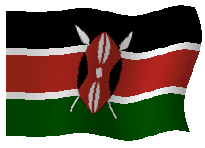
Kenya
Kenya is a land which epitomizes the wonder and mystique of Africa. In this unique country one can find wild animals roaming vast game parks, white-sand beaches and towering mountains rising above the open, rolling plains. Despite this nation’s magnificent natural beauty, Kenya faces tremendous social and political problems. This instability is causing Kenyans to seek for answers beyond government and human institutions. Kenya is a nation ready to respond to the Gospel of Christ.
Kenya’s first inhabitants were hunting groups who wandered the vast plains of the area. They mixed with Bantu-speaking peoples of western Africa who had migrated east. Other peoples from Arabia and North Africa also settled in this area and mixed with the original inhabitants. The Kiswahili (Swahili) language was developed by these mixed peoples. In 1887, the British East Africa Company leased the Kenyan coast from the Sultan of Zanzibar. Kenya became a British protectorate in 1895 and a colony in 1920. The British faced a period of violent uprisings in the 1950’s known as the Mau-Mau Rebellion. In 1963 Kenya was granted its independence but remained within the British Commonwealth.
The Kenyan people are very diverse with at least 47 distinct ethnic groups which are divided largely along linguistic lines. Such divisions often create social tensions which can result in violence and bloodshed. The official languages of Kenya are English and Swahili, but most people speak one of the many tribal dialects.
As much as 82% of the population is nominally affiliated with a Christian denomination, however many continue to practice traditional religions. There is a great lack of correct spiritual knowledge among Christians. Very few have a proper understanding of God’s grace and salvation through faith in the work of Christ on the Cross.
TCM History
The ministry of Things to Come Mission (TCM) in Kenya began in 1984 when Vernon and Darlene Anderson answered the invitation of a Kenyan, Festus Njoka, to go and teach the Kenyans about the Gospel of Grace. Convinced that TCM should begin preaching and establishing churches in Kenya, Vernon helped a small group of believers organize under the name Grace Bible Fellowship (GBF). The seeds for growth were planted. The GBF was limited in its ability to grow because of a lack of trained national leaders. For the work to develop there needed to be a training program to equip the nationals with the knowledge and skills necessary for ministry in the local churches.
In 1986 Ben and Joyce Anderson joined Vernon and Darlene to work at establishing a residential Bible School. Grace Bible School was opened in the city Embu in 1989. Grace Bible Church was also registered in Kenya. The Embu school gave way to a modular Grace Pastoral Training (GPT) program. A residential Bible school, Kenya Grace Bible Institute (KGBI) was later established in Thika. The GPT program continues to provide training for pastors, a Bi-Vocational Training (BVT) program serves pastors who also hold other jobs, and the Berean Grace School of Ministry (BGSM) trains pastors in the Coast region.
In 2016 Kenya entered the Release phase of TCM’s Troas Strategy and the work was turned over to national leaders.
Kenya serves as the orientation base for new missionaries with Team East Africa. TCM’s International Director, Ben & Joyce Anderson, use Kenya as their base of operations for Africa.
Several TCM missionaries helped the work in Kenya grow through the Target, Plant and Train phases of the Troas Strategy.
- Vernon & Darlene Anderson
- Ben & Joyce Anderson
- Valerie Anderson
- Jessie Easterly
- Mike & Donna Maleski
- Mike & Loretta Smyczynski
- Genesis & Verna Maraat
- Gardener & Ledith Improso
- Carlo & Elma Paña
- Luz Gaddi
- Ed & Linda Bedore
- Jim & Missy Tollar
- Robby & Tegwen Heath
Robby Heath currently seeks to mobilize Kenyan believers for missions and help Kenya move into the Partner phase of TCM’s Troas Strategy.

